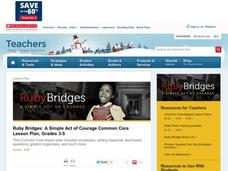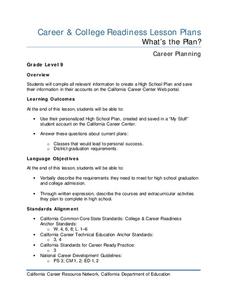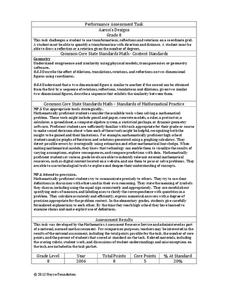Scholastic
Ruby Bridges: A Simple Act of Courage, Grades 3-5
Through character trait graphic organizers, a vocabulary sorting activity, class discussion, and a civil rights movement slide show, your young historians will be introduced to the amazing story of Ruby Bridges and her experiences as the...
Constitution Facts
U.S. Constitution Crossword Puzzles: Basic #1
Reinforce U.S. Constitution facts with a crossword puzzle. Scholars show what they know by completing the 53 prompts.
Federal Reserve Bank
Your Credit Report
What is your credit score? How do you find it? Help your pupils answer these questions and more. They will access their free credit report and then analyze its meaning.
California Department of Education
What’s the Plan?
What classes should pupils take to achieve their college and career goals? Explore the options through a lesson designed with the future in mind. Fifth in a series of six college and career readiness lesson plans, the activity challenges...
PBS
Robot Body Language
Don't be so emotional! Scholars take part in an activity where they consider how future robots will be able to show emotions. They place paper bags over their heads, act out emotions through body movements, and have others guess the...
Inside Mathematics
Aaron's Designs
Working with transformations allows the class to take a turn for the better. The short assessment has class members perform transformations on the coordinate plane. The translations, reflections, and rotations create pattern designs on...
Scholastic
Final Project: The Earth, Inside Earth
Follow in Jules Verne's footsteps and take a journey to the center of the earth! Middle schoolers work together to design a trip inside the earth using their knowledge from the previous lessons in the unit.
Virginia Department of Education
Lines and Angles
Explore angle relationships associated with transversals. Pupils construct parallel lines with a transversal and find the measures of the angles formed. They figure out how the different angles are related before constructing...
Chicago Botanic Garden
Personal Choices and the Planet
How big is your footprint? Activity three culminates the series by having groups complete carbon footprint audits with people in their schools and/or around the districts. Groups then gather their data, create a presentation including...
Shodor Education Foundation
Two Variable Function Pump
Use a function to operate on two variables. Pupils look at operating with complex numbers as a function of two variables. The interactive squares the input and adds a constant to it. Learners visualize the resulting output and its...
California Department of Education
Choosing My Lifestyle
How much does it cost to live the life your dream life? Scholars explore the pitfalls of personal finance through planning, discussion, and research. The first lesson plan in a five-part series tasks individuals with determining an...
Kenan Fellows
Reading Airline Maintenance Graphs
Airline mechanics must be precise, or the consequences could be deadly. Their target ranges alter with changes in temperature and pressure. When preparing an airplane for flight, you must read a maintenance graph. The second lesson of...
Curated OER
Problem Based Learning
Students increase problem solving skills. They research computer-related crimes, classifying them into the types of crimes. Students create a crime report. They present a presentation to the class.
Curated OER
Energy in the Home
In this energy use activity, students read about kilowatts and solve 2 problems. They find the costs to run certain electrical items for a given amount of time and they determine the electricity consumption of an accelerator that runs...
Curated OER
African American Inventors
Young scholars use the Internet to research African American inventors. They work with a partner to complete a graphic organizer about the inventors and the inventions.
Curated OER
"Place the State" Game
Students participate in a computer game in which they locate and place the U.S. states on a blank outline map. In small groups, they take turns dragging and dropping the states in the proper location on a map.

















